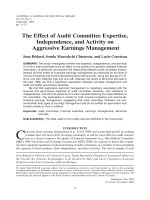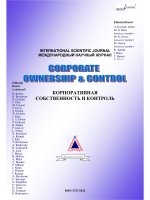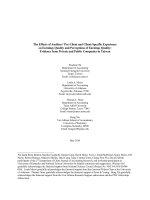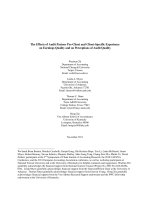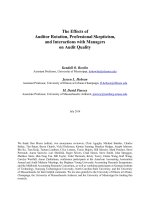chi et al - 2010 - the effects of auditors’ pre-client and client-specific experience on earnings quality and perceptions of earnings quality in taiwan
Bạn đang xem bản rút gọn của tài liệu. Xem và tải ngay bản đầy đủ của tài liệu tại đây (218.77 KB, 40 trang )
The Effects of Auditors’ Pre-Client and Client-Specific Experience
on Earnings Quality and Perceptions of Earnings Quality:
Evidence from Private and Public Companies in Taiwan
Wuchun Chi
Department of Accounting
National Chengchi University
Taipei, Taiwan
Email:
Linda A. Myers
Department of Accounting
University of Arkansas
Fayetteville, Arkansas 72701
Email:
Thomas C. Omer
Department of Accounting
Texas A&M University
College Station, Texas 77843
Email:
Hong Xie
Von Allmen School of Accountancy
University of Kentucky
Lexington, Kentucky 40506
Email:
May 2010
We thank Brian Bratten, Monika Causholli, Guojin Gong, David Hulse, Yue Li, Linda McDaniel, James Myers, Jeff
Payne, Robert Ramsay, Marjorie Shelley, Shui-Liang Tung, Cynthia Vines, Chung-Fern Wu, David Ziebart,
participants of the 2
nd
Symposium of China Journal of Accounting Research, and workshop participants at
University of Kentucky and National Taiwan University for helpful comments and suggestions. Wuchun Chi
gratefully acknowledges the financial support from National Science Council (Project No. NSC 94-2416-H-004-
036). Linda Myers gratefully acknowledges the financial support from the Garrison/Wilson Chair at the University
of Arkansas. Thomas Omer gratefully acknowledges the financial support of Ernst & Young. Hong Xie gratefully
acknowledges the financial support from the Von Allmen Research Support endowment and the PWC fellowship
endowment.
The Effects of Auditors’ Pre-Client and Client-Specific Experience
on Earnings Quality and Perceptions of Earnings Quality:
Evidence from Private and Public Companies in Taiwan
Abstract
We examine the effects of auditors’ pre-client and client-specific experience on earnings
quality and perceptions of earnings quality for both private and public companies using audit
data from Taiwan, where the names of signing audit partners are disclosed and large private
companies as well as public companies are required to publish audited financial statements. Our
pre-client experience measures consist of audit partner pre-client general experience and pre-
client industry experience for both private and public companies. Our client-specific experience
measures consist of audit partner tenure and audit firm tenure for private companies and consist
of pre-listing audit partner tenure, pre-listing audit firm tenure, post-listing audit partner tenure,
and post-listing audit firm tenure for public companies. Following prior literature, we use
discretionary accruals to proxy for earnings quality and bank loan interest rates to proxy for
creditor perceptions of earnings quality. We find that our various measures of pre-client and
client-specific experience enhance earnings quality and perceptions of earnings quality for both
private and public companies with the impact of pre-client experience generally being smaller
than that of client-specific experience. Our findings are important because they demonstrate the
importance of considering prior auditor experience when rotating audit partners for both private
and public companies.
- 1 -
The Effects of Auditors’ Pre-Client and Client-Specific Experience
on Earnings Quality and Perceptions of Earnings Quality:
Evidence from Private and Public Companies in Taiwan
1. Introduction
Ball and Shivakumar (2005) examine timely loss recognition, an important attribute of
financial reporting quality, for private and public companies in the United Kingdom (U.K.).
Although U.K. private companies are subject to essentially the same regulatory provisions as
U.K. public companies, Ball and Shivakumar (2005) argue that the market for financial reporting
differs substantially between private and public companies because private companies are less
likely to use public financial statements in contracting with lenders and other stakeholders. In
addition, their financial reporting is more likely to be influenced by taxation, dividend policy,
and other company policies. These differences imply a lower demand for financial statement
quality (and hence, lower earnings quality) for private companies relative to public companies.
Consistent with this, Ball and Shivakumar (2005) find that U.K. public companies practice more
timely loss recognition than do U.K. private companies (see also Burgstahler, Hail, and Leuz
2006).
We extend this line of research by examining the effects of various measures of auditor
experience on earnings quality and perceptions of earnings quality for both private and public
companies in Taiwan. Like in the U.K., large private companies in Taiwan face the same
financial reporting and auditing standards as public companies. In addition, before 2002, large
private companies were required, like public companies, to file and publish their audited
financial statements (more detailed discussion later). In Taiwan, audit reports for both private
and public companies contain not only the audit opinion but also the names of the audit firm and
two signing partners. These unique features of the Taiwanese audit market allow us to develop
- 2 -
two measures of auditors’ pre-client experience for both private and public companies: (1) the
audit partner’s pre-client general experience (i.e., the number of cumulative years since the first
year when the auditor became a signing partner till the first year when he was a signing partner
in the current client’s industry); and (2) the audit partner’s pre-client industry experience (i.e.,
the number of cumulative years since the first year when the auditor was a signing partner in the
current client’s industry till the first year in the current client-partner relationship). For private
companies, we use audit partner tenure (i.e., the number of cumulative years that the auditor has
been a signing partner in the current client-partner relationship) and audit firm tenure (i.e., the
number of consecutive years that the current client-firm relationship has existed) as our measures
of the auditor’s client-specific experience. For public companies, we separate audit partner
tenure and audit firm tenure into two periods: (1) the period before the company’s initial public
offering (IPO); and (2) the period after the IPO. Specifically, we measure the number of
cumulative years in which the audit partner audited the company while it was still private, as
well as the number of cumulative years in which the audit partner audited the company once it
had gone public. We label the former pre-listing audit partner tenure and the latter post-listing
audit partner tenure. We define pre-listing audit firm tenure and post-listing audit firm tenure
similarly.
The effect of auditor experience (or tenure) on earnings quality and perceptions of
earnings quality has been the focus of intense debate and research in the United States (U.S.) but
research is limited to the audit firm level because of data availability. Prior research using U.S.
data generally concludes that both earnings quality and perceptions of earnings quality increase
with audit firm tenure (Johnson, Khurana, and Reynolds 2002; Myers, Myers, and Omer 2003;
Mansi, Maxwell, and Miller 2004; Ghosh and Moon 2005). However, several studies using non-
- 3 -
U.S. data examine the effect of audit partner tenure on earnings quality and find mixed results.
For example, using Australian data, Carey and Simnett (2006) find evidence suggesting that
earnings quality declines with audit partner tenure. In contrast, using Taiwanese data, Chen, Lin,
and Lin (2008) find evidence suggesting that earnings quality increases with audit partner tenure.
We address several research questions in this paper. First, findings in Ball and
Shivakumar (2005) and Burgstahler et al. (2006) suggest that financial reporting quality is lower
for private companies than for public companies. We examine whether auditor experience (both
pre-client and client-specific) enhances earnings quality for private companies and thus mitigates
the low financial reporting quality problem inherent in private companies due to the lack of
capital market discipline and other institutional factors. This question is unexplored in the
literature due to prior data limitations. Because private companies make up a large portion of the
economy and audit firms do much of their work for private clients (especially those seeking debt
financing), it is, therefore, important to understand how auditor experience affects the earnings
quality of private companies.
Second, we investigate the effect of auditors’ pre-client experience (taking into account
the effect of client-specific experience) on earnings quality and perceived earnings quality for
public companies.
1
An important assumption underlying the mandatory audit partner rotation
policy is that the lack of client-specific experience of the incoming audit partner can be
alleviated by his prior non-client-specific experience (i.e., pre-client experience) so that, coupled
with presumably enhanced auditor independence, mandatory partner rotation enhances audit
quality. However, whether pre-client experience enhances audit quality and whether pre-client
1
Earnings and audit quality are inextricably linked in this context. Because higher audit quality should improve
earnings quality, we discuss ‘earnings quality’ or ‘perceptions of earning quality’ rather than ‘audit/earnings quality’
or ‘perceptions of audit/earnings quality’ throughout the paper.
- 4 -
experience is as effective as client-specific experience in enhancing audit quality are unexplored
in the extant literature.
2
Our paper can shed light on these two important questions.
Finally, we examine the effects of pre-listing audit partner tenure and pre-listing audit
firm tenure on earnings quality and perceptions of earnings quality for public companies. Here,
we examine whether client-specific experience accumulated over the years during which a public
company was still private can benefit the auditor’s work on that company in the current year.
Again, the issue of pre-listing experience is unexplored in the literature.
To summarize, we exploit the unique features of the Taiwanese audit market and develop
a more complete set of auditor experience measures than in prior studies in order to shed new
light on the relation between earnings quality/perceived earnings quality and auditor experience
for both private and public companies.
Following Chen et al. (2008), we measure earnings quality using performance-matched,
modified Jones model-estimated discretionary accruals. For private companies, we find that,
consistent with prior studies using samples of public companies, discretionary accruals are less
extreme the longer the audit partner tenure and audit firm tenure. We also find that for private
companies, greater pre-client general experience reduces the magnitude of discretionary accruals,
and more specifically, reduces extreme positive discretionary accruals. However, we find no
relation between pre-client general experience and negative discretionary accruals and we find
no association between pre-client industry experience and absolute, positive, or negative
discretionary accruals.
For public companies, we find that while pre-client general experience also reduces the
magnitude of discretionary accruals, it constrains extreme negative, rather than extreme positive,
2
The extant literature only provides evidence that client-specific experience as captured by audit firm tenure (Myers
et al. 2003) or as captured by audit partner tenure (Chen et al. 2008) is important for audit quality. However, it does
not consider the effect of pre-client experience.
- 5 -
discretionary accruals. However, similar to our private company results, pre-client industry
experience does not constrain absolute, positive, or negative discretionary accruals for public
companies. Regarding client-specific experience, we find that pre-listing partner tenure
constrains the magnitude of discretionary accruals overall, as well as extreme negative
discretionary accruals. Pre-listing audit firm tenure also constrains extreme negative
discretionary accruals.
3
Finally, our post-listing partner tenure and post-listing firm tenure
results are entirely consistent with Chen et al. (2008) in that earnings quality tends to increase in
both post-listing partner tenure and post-listing firm tenure. These results suggest that although
pre-client general experience enhances audit quality, it does so to a lesser extent than client-
specific experience. This implies that the loss of the outgoing partner’s client-specific
experience cannot be fully compensated for by the incoming partner’s non-client-specific
experience in a mandatory audit partner rotation regime.
Following Mansi et al. (2004), we use bank loan pricing to proxy for creditor perceptions
of earnings quality, but we use this proxy for both private and public companies.
4
For private
companies, we find that pre-client general experience, pre-client industry experience, and client-
specific partner tenure all lower bank loan pricing. However, client-specific audit firm tenure
has no incremental effect on bank loan pricing.
For public companies, we find that lower bank loan pricing is associated with both pre-
client general experience and pre-client industry experience. In addition, lower bank loan
pricing is associated with all of our measures of client-specific experience – pre-listing audit
3
Note that previous studies using samples of public companies find that audit firm tenure constrains both positive
and negative accruals but these studies generally do not consider pre-listing experience (i.e., they consider only post-
listing experience).
4
Mansi et al. (2004) study the relation between audit firm tenure and creditor perceptions of earnings quality for
public companies in the U.S.
- 6 -
partner tenure, pre-listing audit firm tenure, post-listing audit partner tenure, and post-listing
audit firm tenure.
We conjecture that our measures of pre-client experience and client-specific experience
affect creditor perceptions of earnings quality for both private and public companies because
creditors in our study (who are primarily Taiwanese banks) likely have greater confidence in
financial statements audited by signing partners who have more auditing experience, regardless
of whether that experience is accumulated with the current client (i.e., pre-listing audit partner
tenure and post-listing audit partner tenure) or with other clients (i.e., pre-client general
experience and pre-client industry experience).
Our study contributes to the audit literature by examining the influence of a richer set of
auditor experience measures (both pre-client and client-specific) on earnings quality and
perceptions of earnings quality for both private and public companies. We document that pre-
client experience has an incremental positive impact on earnings quality and perceptions of
earnings quality for both private and public companies but its effect is smaller than the effect of
client-specific experience. This implies a net transition cost associated with mandatory audit
partner rotation although the transition cost is decreasing in auditor pre-client experience.
Moreover, we document that client-specific experience accumulated at the audit partner or audit
firm level during the years in which a public company was still private (i.e., the pre-listing
partner tenure and pre-listing firm tenure) has an incremental positive impact on earnings quality
and perceived earnings quality, even after controlling for client-specific audit partner tenure and
audit firm tenure following the client’s IPO.
These findings have a number of implications. First, prior studies suggest that mandatory
partner rotation does not enhance earnings quality (Chi et al. 2009) or is unlikely to enhance
- 7 -
earnings quality (Chen et al. 2008). Our findings imply that using an incoming audit partner
with greater pre-client experience to replace the outgoing audit partner (who has greater client-
specific experience) can partially, albeit not fully, mitigate the detrimental effects of removing
the outgoing audit partner. Second, on July 28, 2009, the Public Company Accounting Oversight
Board (PCAOB) issued a concept release to seek public comments on its proposal to require that
the engagement audit partner sign the audit report. The Board believes that requiring audit
partner signatures “would increase transparency about who is responsible for performing the
audit, which could provide useful information to investors” (PCAOB 2009, 5). Our finding that
creditors perceive higher earnings quality for financial statements signed by audit partners with
more experience supports the Board’s belief.
Our findings also supplement those in Ball and Shivakumar (2005) and Burgstahler et al.
(2006). While they find that financial reporting of private companies is of lower quality than
that of public companies, our results suggests that the earnings quality of private companies, as
well as that of public companies, is increasing in auditor experience. Thus, auditor experience
can mitigate the low financial reporting quality problem inherent in private companies.
In the next section, we review the prior literature and develop our hypotheses. Section 3
describes our sample selection. Our empirical models and results appear in section 4, and
section 5 concludes.
2. Literature Review and Hypothesis Development
Numerous studies investigate the relation between audit firm tenure and earnings quality
in the U.S. setting. These studies use discretionary accruals (Johnson et al. 2002; Myers et al.
2003), restatements (Stanley and DeZoort 2007), and fraudulent financial reporting (Carcello and
- 8 -
Nagy 2004) to proxy for earnings quality.
5
Studies investigating the relation between audit firm
tenure and perceptions of earnings quality include Mansi et al. (2004), which uses the cost of
debt financing to proxy for creditor perceptions, and Ghosh and Moon (2005), which uses
earnings response coefficients (ERCs) to proxy for investor perceptions.
6
The basic argument in these studies revolves around claims made by supporters of
mandatory audit firm rotation—that long auditor tenure leads to complacency over time and, thus,
to a reduction in audit quality and earnings quality, and around counter-arguments made by
opponents of mandatory audit firm rotation—that mandatory rotation imposes costs on the audit
process that result in reduced audit quality and earnings quality in the early years of the audit
engagement. Overall, results of archival studies in the U.S. setting provide no evidence of a
deterioration of earnings quality with longer audit firm tenure. However, a limitation of these
studies is that they cannot take into account the contemporaneous effect of audit partner tenure
because audit partner identity is not publicly available in the U.S.
Several studies in international settings consider the joint effects of audit firm tenure and
audit partner tenure, or consider the effects of audit partner tenure in isolation. For example,
Carey and Simnett (2006) investigate whether audit partner tenure is associated with the
auditor’s propensity to issue a going-concern audit opinion to distressed companies, the direction
and amount of abnormal working capital accruals, and the propensity to just beat earnings
benchmarks using Australian data. They do not find an association between long partner tenure
and abnormal working capital accruals, but they find a lower propensity to issue going-concern
opinions and some evidence that clients are more likely to just beat earnings benchmarks when
5
We focus on discretionary accruals because this proxy for earnings quality is available for both private and public
companies in our sample.
6
Similarly, we focus on the cost of debt financing (i.e., creditor perceptions) because this proxy for perceptions of
earnings quality is available for both private and public companies in our sample.
- 9 -
partner tenure is long. Overall, their results suggest that, at least in the Australian audit market,
long partner tenure tend to reduce earnings quality. They do, however, acknowledge that the
diminution in earnings quality is generally confined to clients of non-Big 5 audit firms.
Prior research using samples of public companies in the Taiwanese setting provides
conflicting results regarding the effects of audit partner tenure and audit firm tenure on
discretionary accruals. In early work, Chi and Huang (2005) find that the association between
both audit partner tenure and audit firm tenure and signed discretionary accruals is negative
when tenure is five years or less, but that it becomes positive when tenure exceeds five years.
However, they do not consider the absolute value of discretionary accruals nor do they examine
positive and negative discretionary accruals separately, which Myers et al. (2003) reveal to be
important for determining the effect of long tenure. In later work, Chen et al. (2008) use the
absolute value of discretionary accruals and signed discretionary accruals to proxy for earnings
quality. They find that absolute and positive discretionary accruals decrease with partner tenure,
and that absolute discretionary accruals decrease with audit firm tenure (after controlling for
audit partner tenure).
As noted previously, an important assumption underlying the mandatory audit partner
rotation policy is that the incoming partner’s lack of client-specific experience can be alleviated
by his pre-client experience. However, this implicit assumption has not been tested empirically
in the extant literature because prior studies only investigate the effects of audit partner tenure
and audit firm tenure (i.e., client-specific experience) but do not address the effects of audit
partners’ pre-client experience. Given prior findings that the incoming partner’s lack of client-
specific experience adversely affects earnings quality (e.g., Chen et al. 2008; Chi et al. 2009), it
- 10 -
is important to investigate the extent to which the incoming partner’s pre-client experience
impacts earnings quality and perceptions of earnings quality.
We suggest that signing partner pre-client general and industry experience likely impacts
(real and perceived) earnings quality because auditor experience can improve error or
misstatement detection (Tubbs 1992; Hammersley 2006) and can reduce auditor reliance on
management’s favorable assessments (Kaplan et al. 2008).
7
Specifically, Tubbs (1992)
investigates how experience changes auditors’ knowledge of errors and irregularities. He finds
that more experienced auditors recognize more atypical errors and recall more errors, and
suggests that this should improve audit quality; we suggest that it should also improve earnings
quality.
8
Similarly, Hammersley (2006) finds that industry experience allows auditors to develop
better knowledge structures which allow them to identify misstatements for companies in their
industry and to specify the appropriate audit response even when they receive only partial
information about a misstatement. Kaplan et al. (2008) test whether experience limits auditor
reliance on management-provided information when that information is more favorable than an
objective benchmark. They find that as auditors gain experience, they are more able to deflect
management’s persuasion attempts.
Shelton (1999) and Trotman, Wright, and Wright (2008) are also relevant to our
hypotheses. Shelton (1999) finds that experience reduces the impact that irrelevant information
can have on audit judgments, suggesting that signing partners with greater pre-client experience
may be better able to focus on relevant information. Moreover, Trotman et al. (2008) find that
7
Note that one argument advanced as supporting audit partner rotation is that the new auditor is less likely to
concede to management pressure for reporting specific financial outcomes and because (s)he brings ‘a fresh set of
eyes’ to the table, and thus is more likely to detect errors than are audit partners who may have become complacent
because of their long tenure.
8
Similarly, a number of empirical studies find that financial analyst performance improves with experience. See,
for example, Mikhail, Walther, and Willis (1997; 2003) and Drake and Myers (2010), and Keskek, Myers, Omer,
and Shelley (2010).
- 11 -
engaging in mock negotiations about financial reporting issues prior to client negotiations
improves auditor negotiation performance, suggesting that signing partner pre-client experience
should improve auditor performance in negotiations with clients, and we suggest that this should
improve audit and earnings quality.
9
Mansi et al. (2004) study the effect of audit firm tenure on creditor perceptions of public
companies’ earnings quality using the cost of debt to proxy for perceived earnings quality. They
find that audit firm tenure is negatively associated with the cost of debt financing, suggesting that
creditors view extended audit firm tenure favorably. However, they are unable to consider the
effect of signing partner experience (either pre-client general or industry experience or client-
specific experience) on perceptions because of data limitations in the U.S. setting. We posit that
a signing partner with substantial pre-client experience is more likely to be known to creditors in
the Taiwanese market, and that, all else equal, creditors are likely to value this experience
favorably.
To summarize, we investigate the effects of auditors’ pre-client and client-specific
experience on earnings quality and perceptions of earnings quality for both private and public
companies in Taiwan. Our hypotheses, stated in the null, are as follows:
H1: There is no association between earnings quality and auditors’ pre-client and client-
specific experience for private or public companies.
H2: There is no association between creditor perceptions of earnings quality and auditors’
pre-client and client-specific experience for private or public companies.
9
The Public Company Accounting Oversight Board also acknowledges the importance of auditor experience and
was described in a recent article as listing ‘ineffective reviews because the concurring partner lacked expertise and
experience’ as one of the most serious and common problems it found during its first three years of inspections (see
“The 11 Things Auditors Need to Fix” in CFO.com, October 23, 2007).
- 12 -
3. Sample Selection
Taiwanese Company Law and Securities and Exchange Act divide limited liability
companies into two categories: (1) those that are required to file audited financial statements
with the regulatory authority and make these statements available to the general public; and (2)
those that are not required to file or publish audited financial statements. Beginning in 1980, the
laws in Taiwan require all publicly listed companies and large privately-held companies whose
capital level exceeds a certain threshold to file and publish audited financial statements.
10
The
threshold was 200,000,000 New Taiwan Dollars (TWD) until 2000 but it was increased to
500,000,000 TWD in 2000 in response to critics’ concerns that the benefit of requiring large
private companies to file and publish audited financial statements may not exceed the cost of
compliance. However, concerns remained, and on November 12, 2001, the requirement for large
private companies to file and publish audited financial statements was rescinded. Although
many large private companies continued to publish audited financial statements after 2001, an
increasing number chose to cease publication. Note, however, that publicly listed companies are
always required to file and publish audited financial statements.
In Taiwan, large private companies and public companies face identical financial
reporting requirements and are subject to the same auditing standards. The Taiwan Economic
Journal (TEJ) collects financial statement data for both large private and public companies, and
also collects stock market data for public companies. A company is included in TEJ’s public
company database for the years in which it is listed on a Taiwanese stock exchange and is
10
Public companies are those whose stocks are traded on the Taiwan Stock Exchange Corporation or on the GreTai
Securities Market, which are analogous to the New York Stock Exchange and National Association of Securities
Dealers Automated Quotation System, respectively, in the U.S. Private companies are those whose stocks are not
listed (publicly traded) on any stock exchange.
- 13 -
included in the TEJ’s private company database for the years in which it is not traded on a
Taiwanese stock exchange. If a company changes its type in a year (e.g., from private to public),
the TEJ includes that company’s public (private) years in the public (private) company database
and does not retroactively reclassify the company’s prior years according to its latest type.
We collect data for 1990 through 2001 from the 2008 TEJ annual database. Our sample
period starts in 1990, following Chen et al. (2008), because companies were initially required to
prepare statements of cash flow in that year and we use the statement of cash flow approach to
calculate total accruals (Hribar and Collins 2002). Our sample period ends in 2001 because large
private companies were no longer required to file and publish audited financial statements after
2001.
We initially obtain 22,225 (5,797) company-year observations from 2008 TEJ’s private
(public) company database. Consistent with prior studies, we delete 636 (419) observations in
the financial services industry. In addition, we eliminate 9,492 (174) observations because of
missing beginning-of-the-year total assets, cash from operations, growth, and tenure measures
for our private (public) companies. Finally, we delete 1,606 (67) observations in industries with
less than 8 observations available for calculating discretionary accruals. This provides us with
10,491 (5,137) company-year observations in our discretionary accruals sample. We use this
sample to examine the effects of pre-client experience and client-specific experience on earnings
quality. In the next section, we describe how we derive our bank loan pricing sample from this
discretionary accruals sample, and we use the bank loan pricing sample to examine the effects of
pre-client experience and client-specific experience on creditor perceptions of earnings quality.
- 14 -
4. Empirical Models and Results
In this section, we examine the effects of auditors’ pre-client and client-specific
experience on earnings quality and perceptions of earnings quality for private and public
companies, respectively. We first present our empirical models and results using abnormal
accruals to proxy for earnings quality. We then present our empirical models and results using
bank loan pricing to proxy for creditor perceptions of earnings quality.
4.1 Accrual-based Proxies for Earnings Quality
4.1.1 Variable measurement and empirical model
Prior literature uses various measures of accruals to proxy for earnings quality. We
follow Kothari, Leone, and Wasley (2005) and Chen et al. (2008), and calculate performance-
matched discretionary accruals using the following modified Jones (1991) model:
11
TAC
t
= α
t
(1/TA
t–1
) + β
t
(∆SALES
t
– ∆AR
t
) + γ
t
PPE
t
+ θ
t
ROA
t–1
+ ε
t
(1)
where:
TAC
t
= total accruals in year t, calculated using the statement of cash flow approach
recommended by Hribar and Collins (2002) = income before discontinued
operations and extraordinary items – (cash from operations – discontinued
operations and extraordinary items from the statement of cash flows);
∆SALES
t
= the change in sales revenue between year t and year t-1;
∆AR
t
= the change in accounts receivable between year t and year t-1;
PPE
t
= the gross amount of property, plant and equipment at the end of year t;
ROA
t–1
= return on assets in year t-1, calculated as the ratio of income before
discontinued operations and extraordinary items to total assets; and
TA
t
–1
= total assets at the end of year t-1.
TAC
t
, ∆SALES
t
, ∆AR
t
, and PPE
t
are scaled by lagged total assets (TA
t–1
). We estimate equation
(1) in the cross section in each year (i.e., from 1990 through 2001) for each TEJ industry
11
We omit company subscript i except where doing so causes confusion.
- 15 -
classification with at least eight available observations. The residuals from equation (1) are our
performance-matched discretionary accruals (PMMJDA
t
).
Beginning in 1983, audit reports for both public and large private companies in Taiwan
were required to be signed by two audit partners. The names of the audit firm and of the two
signing partners are disclosed in the audit reports. However, the audit report does not indicate
which partner is the lead (or review) partner. Following Chen et al. (2008), we assume that the
audit partner whose client-specific tenure is longer has more influence on the audit work, and
thus measure partner-related experience variables based on this audit partner.
For each observation in our private company sample, we trace the audit partner back to
1983 to identify the first year in which this partner became a signing partner for any company
(private or public). We define partner total experience (TotExp) as the number of cumulative
years from this partner’s first signing year to the current year. We also identify the first year in
which this partner was a signing partner for any company in the same industry as the current
company, and define partner industry experience (IndExp) as the number of cumulative years
from this partner’s first signing year in that industry to the current year. Finally, we measure the
number of cumulative years during which this partner has been a signing partner for the current
company (since 1983 or the year of the company’s establishment, whichever is later), and define
this as audit partner tenure (PT). Somewhat differently, we measure the number of consecutive
years that the audit firm has been auditing the current company and define this as audit firm
tenure (FT).
12
For each observation in our public companies sample, we define partner total experience
(TotExp) and partner industry experience (IndExp) in the same way as for private companies.
However, we separate audit partner tenure and audit firm tenure into two parts: the portion
12
TEJ calculates and provides TotExp, IndtExp, PT, and FT in its database.
- 16 -
during which the company was still private and the portion during which the company was
public. Specifically, we measure the number of cumulative years during which the partner
audited the current public company from 1983 or the year of its establishment, whichever is later,
to the IPO year and label this pre-listing audit partner tenure (PreListPT). We then measure the
number of cumulative years during which the partner audited the current public company from
the IPO year to the current year, and label this post-listing audit partner tenure (PostListPT).
Thus, the total number of years during which the partner audited the current public company is
the sum of PreListPT and PostListPT. We define pre-listing audit firm tenure (PreListFT) and
post-listing audit firm tenure (PostListFT) similarly. Thus, the total number of years during
which the audit firm audited the current public company is the sum of PreListFT and PostListFT.
Note that Chen et al. (2008) and Myers et al. (2003) measure audit partner tenure and audit firm
tenure for public companies using only the years during which their sample companies were
public and so their measures correspond to our PostListPT and PostListFT. Prior research has
not examined the effects of PreListPT and PreListFT on earnings quality or on perceptions of
earnings quality.
We measure the audit partner’s incremental general experience (IncGenExp) as the
difference between the partner’s total experience (TotExp) and the partner’s industry experience
(IndExp). In addition, we define the audit partner’s incremental industry experience (IncIndExp)
as the difference between the partner’s industry experience (IndExp) and the partner’s tenure.
For private companies, IncIndExp = IndExp – PT; for public companies, IncIndExp = IndExp –
(PreListPT + PostListPT). For both private and public companies, incremental general
experience (IncGenExp) and incremental industry experience (IncIndExp) are measures of pre-
client experience since they capture the partner’s experience gained from auditing companies
- 17 -
prior to the current company. On the other hand, we use audit partner tenure (PT) and audit firm
tenure (FT) to measure client-specific experience for private companies because the former
(latter) captures the audit partner’s (audit firm’s) auditing experience with the current company.
Similarly, we use pre-listing audit partner tenure (PreListPT), post-listing audit partner tenure
(PostListPT), pre-listing audit firm tenure (PreListFT), and post-listing audit firm tenure
(PostListFT) to measure client-specific experience for public companies gained prior to and post
the IPO year.
In order to examine the effects of pre-client and client-specific experience on earnings
quality for private and public companies, respectively, we adapt the model in Chen et al. (2008)
and use the following models for our analyses.
For private companies:
PMMJDA
=
α
0
+ α
1
IncGenExp + α
2
IncIndExp + α
3
PT + α
4
FT + α
5
Size
+ α
6
Growth + α
7
CFO + α
8
BigN + α
9
Age + ηYear + θIndustry + ρ (2)
For public companies:
PMMJDA
=
β
0
+ β
1
IncGenExp + β
2
IncIndExp + β
3
PreListPT + β
4
PreListFT
+ β
5
PostListPT + β
6
PostListFT + β
7
Size + β
8
Growth
+ β
9
CFO + β
10
BigN + β
11
Age + κYear + μIndustry + ζ (3)
where:
PMMJDA
= performance-matched, modified Jones model-estimated discretionary
accruals, measured in absolute, positive, and negative values;
IncGenExp
= audit partner’s incremental general experience for both private and public
companies = the partner’s total experience (TotExp) – the partner’s
industry experience (IndExp);
TotExp
= audit partner’s total experience for both private and public companies =
the number of cumulative years from the first year when the partner
became a signing partner for any company to year t;
IndExp
= audit partner’s industry experience for both private and public companies
= the number of cumulative years from the first year in which the partner
became a signing partner for any company in the same industry as the
current company to year t;
IncIndExp
= audit partner’s incremental industry experience for both private and public
- 18 -
companies; for private companies, IncIndExp = the partner’s industry
experience (IndExp) – the partner’s tenure (PT); for public companies,
IncIndExp = the partner’s industry experience (IndExp) – (the partner’s
pre-listing audit partner tenure (PreListPT) + the partner’s post-listing
audit partner tenure (PostListPT));
PT
= audit partner tenure for private companies = the number of cumulative
years during which the audit partner has audited the current private
company (since 1983 or the year of the company’s establishment,
whichever is later, to year t);
PreListPT
= pre-listing audit partner tenure for public companies = the number of
cumulative years during which the partner audited the current company
while it was private (since 1983 or the year of the company’s
establishment, whichever is later, to the IPO year);
PostListPT
= post-listing audit partner tenure for public companies = the number of
cumulative years during which the partner has audited the current
company since the IPO year to year t;
FT
= audit firm tenure for private companies = the number of consecutive years
during which the audit firm has audited the current private company
(since 1983 or the year of the company’s establishment, whichever is
later, to year t);
PreListFT
= pre-listing audit firm tenure for public companies = the number of
consecutive years during which the audit firm audited the company while
it was private (since 1983 or the year of the company’s establishment,
whichever is later, to the IPO year);
PostListFT
= post-listing audit firm tenure for public companies = the number of
consecutive years during which the audit firm has audited the current
company since the IPO year to year t;
Size
= the natural logarithm of total assets in year t;
Growth
= growth rate of net sales over the previous year;
CFO
= cash from operations from the statement of cash flows in year t, scaled by
total assets at the beginning of year t;
BigN
= a dummy variable equal to 1 if the auditor is from a Big 4 (or 5 or 6) audit
firm, and 0 otherwise;
Age
= the number of years since the company was established;
Year
= year dummies; and
Industry
= industry dummies.
We follow Chen et al. (2008) and include several control variables in equations (2) and
(3). Because prior research finds that the accruals of larger companies tend to be less extreme
(Dechow and Dichev 2002), we include Size.
13
We also include Growth to control for the effect
13
Because large companies face higher political costs (Watts and Zimmerman 1986), they may be less likely to
manage earnings. Consistent with this, Dechow and Dichev (2002) find that large companies tend to report larger
but more stable accruals.
- 19 -
of growth in net sales on a company’s accruals, CFO to control for the negative relation between
accruals and cash from operations (Dechow 1994), BigN to control for the potential effect of
audit firm size on earnings quality (Becker et al. 1998), and Age to control for changes in
accruals over a company’s life cycle (Anthony and Ramesh 1992). Finally, we control for
potential year and industry effects.
4.1.2 Empirical results
Table 1 reports descriptive statistics for the private and public discretionary accruals
samples. The mean and median performance-matched discretionary accruals (PMMJDA) for
private companies are 0.0044 and -0.0060, respectively, whereas those for public companies are
0.0046 and -0.0034. The mean and median |PMMJDA| are 0.1059 and 0.0699 for private
companies, and 0.0787 and 0.0513 for public companies. The mean and median |PMMJDA| for
private companies are both significantly larger than their counterparts for public companies
(untabulated). This suggests that earnings quality of private companies, on average, is lower
than that of public companies, consistent with Ball and Shivakumar (2005) and Burgstahler et al.
(2006). The mean partner total experience (TotExp) and industry experience (IndExp) for private
companies (10.5286 years and 6.4800 years) are both shorter than their counterparts for public
companies (11.7281 years and 8.8532 years). However, the mean audit partner incremental
general experience (IncGenExp) and incremental industry experience (IncIndExp) are both larger
for private companies. The mean audit partner tenure for private companies (PT) is 4.0132 years,
which is smaller than the combined pre- and post-listing partner tenure (PreListPT + PostListPT)
for public companies (7.4780 years). The mean audit firm tenure for private companies (FT) is
3.9534 years, which is also smaller than the combined pre- and post-listing audit firm tenure
(PreListFT + PostListFT) for public companies (7.6222 years). Finally, the mean Size, CFO,
- 20 -
BigN, and Age for private companies are all smaller than their respective public company
counterparts, but the mean Growth is larger for private companies than for public companies.
[Insert Table 1 here]
We examine the effects of pre-client and client-specific experience on earnings quality
for private companies using equation (2). We first estimate equation (2) for the full private
companies sample; here, the dependent variable is the absolute value of accruals (|PMMJDA|)
and we use ordinary least squares regression. We then estimate equation (2) for positive and
negative accruals subsamples; here, the dependent variable is positive accruals (PMMJDA ≥ 0)
or negative accruals (PMMJDA < 0) and we use truncated regression.
Table 2 presents our findings. Joint tests on the effect of incremental general experience
and incremental industry experience (IncGenExp + IncIndExp) are insignificant when the
dependent variable is absolute, positive, or negative discretionary accruals. This suggests that
joint effect of pre-client experience is not associated with earnings quality for private companies.
However, when the dependent variable is |PMMJDA|, the coefficient on incremental general
experience (IncGenExp) is marginally significantly negative (-0.0006, p-value = 0.10),
suggesting that audit partners with more incremental general experience constrain the magnitude
of discretionary accruals. Moreover, the coefficient on IncGenExp is significantly negative (-
0.0010, p-value = 0.01) when the dependent variable is positive discretionary accruals
(PMMJDA ≥ 0) but is insignificant when the dependent variable is negative discretionary
accruals (PMMJDA < 0). Thus, audit partners with more incremental general experience
constrain the reporting of extreme positive discretionary accruals but not extreme negative
accruals. Together, we find some evidence that greater incremental general experience enhances
earnings quality for private companies. In contrast, the coefficient on incremental industry
- 21 -
experience (IncIndExp) is insignificant in all three regressions. Thus, there is no evidence that
more pre-client industry experience enhances earnings quality for our private companies.
[Insert Table 2 here]
Turning to auditors’ client-specific experience, the coefficients on audit partner tenure
(PT) and on audit firm tenure (FT) are both significantly negative when the dependent variable is
absolute discretionary accruals or positive discretionary accruals. Following Chen et al. (2008,
Table 5), we also test whether the sum of the coefficients on PT and FT is significantly different
from zero, and find that the sum is also significantly negative when the dependent variable is
absolute or positive discretionary accruals. However, the coefficient on partner tenure (PT) is
only marginally positive (0.0013, p-value = 0.10) when the dependent variable is negative
discretionary accruals, and the coefficient on FT is insignificant. In addition, the sum of the
coefficients on PT and FT is insignificant when the dependent variable is negative discretionary
accruals. Taken together, these findings suggest that for private firms, longer audit partner
tenure enhances earnings quality by constraining the reporting of extreme positive and extreme
negative discretionary accruals, and that longer audit firm tenure enhances earnings quality by
constraining the reporting of extreme positive discretionary accruals.
To summarize, we find some weak evidence that longer audit partner incremental general
experience enhances earnings quality for private companies in Table 2. In contrast, we find
strong evidence that earnings quality increases with audit partner and audit firm tenure. Thus,
the beneficial impacts of long audit partner tenure and audit firm tenure documented in Chen et
al. (2008) and Myers et al. (2003) for public companies extend to private companies, at least in
Taiwan.
- 22 -
Next, we use equation (3) to examine the effects of pre-client and client-specific
experience on earnings quality for public companies. Our findings are reported in Table 3. We
first discuss findings on pre-client experience. The coefficient on IncGenExp is significantly
negative (-0.0012, p-value = 0.03) when the dependent variable is absolute discretionary accruals,
insignificantly different from zero (-0.0002, p-value = 0.65) when the dependent variable is
positive discretionary accruals, and significantly positive (0.0013, p-value = 0.01) when the
dependent variable is negative discretionary accruals. These findings suggest that audit partners
with more incremental general experience constrain the reporting of extreme negative accruals,
and thus, longer incremental general experience enhances earnings quality. In addition, joint
tests on the effect of incremental general experience and incremental industry experience
(IncGenExp + IncIndExp) are significant when the dependent variable is absolute or negative
discretionary accruals. As is the case with private companies, we find no relation between
incremental industry experience (IncIndExp) and discretionary accruals in any of our regression
models. Thus, we find some weak evidence that incremental general experience (IncGenExp)
enhances earnings quality.
[Insert Table 3 here]
We now discuss findings on client-specific experience in Table 3. First, we find that the
coefficient on pre-listing audit partner tenure (PreListPT) is significantly negative (-0.0019, p-
value = 0.04) and the coefficient on pre-listing audit firm tenure (PreListFT) is insignificant (-
0.0011, p-value = 0.19) when the dependent variable is absolute discretionary accruals. The sum
of these coefficients is also significantly negative (-0.0030, p-value = 0.00). Thus, our findings
suggest that an audit partner’s client-specific pre-listing experience enhances earnings quality by
constraining extreme accruals. However, when the dependent variable is positive discretionary
- 23 -
accruals, the coefficients on PreListPT, PreListFT, and the sum of these coefficients are all
insignificant, so pre-listing experience does not appear to affect upward earnings management
attempts. Moreover, when the dependent variable is negative discretionary accruals, the
coefficients on PreListPT, PreListFT, and the sum of these coefficients are all significantly
positive, suggesting that greater pre-listing audit partner and audit firm experience enhance
earnings quality by constraining extreme negative discretionary accruals (i.e., big baths). Finally,
our findings on post-listing partner tenure and post-listing audit firm tenure are entirely
consistent with Chen et al. (2008) and Myers et al. (2003). Specifically, joint tests of PostListPT
and PostListFT reveal that longer post-listing partner and audit firm tenure constrain the
reporting of extreme absolute, extreme positive, and extreme negative accruals.
To summarize, we find some weak evidence that pre-client experience, specifically audit
partners’ incremental general experience (IncGenExp), enhances earnings quality for public
companies in Table 3. In contrast, we find consistent and strong evidence that audit partners’
client-specific experience (PreListPT and PostListPT) enhances earnings quality. These findings
imply that the incoming partner’s pre-client experience is unlikely adequate to compensate the
loss of the outgoing partner’s client-specific experience, resulting in a net transition cost in a
mandatory audit partner rotation regime. Finally, we find that client-specific experience
accumulated over time by audit partners and audit firms during the years before a client goes
public (PreListPT and PreListFT) can also enhance earnings quality, so audit firms may wish to
consider these factors when rotating audit partners and audit committees may wish to consider
this when selecting auditors.
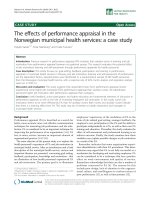
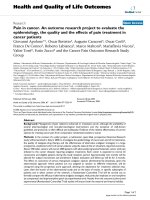
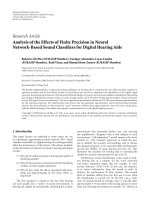

![balasubramanian et al - 2010 - the relation between firm-level corporate governance and market value - a case in idian [icgi]](https://media.store123doc.com/images/document/2015_01/02/medium_3Hxrq8k1Mt.jpg)
